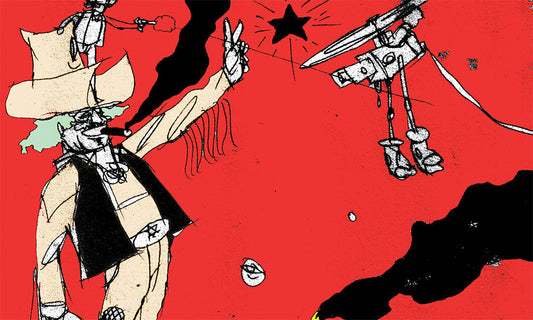Persian Jews Caught in Immigration Dragnet
Text by Ruth Andrew Ellenson
This article was originally published in HEEB #4, Fall 2003
The Bush administration’s “war on terror” and its homeland security measures have raised the ire of all who value civil liberties. But the Jewish connection to the war on terror is more personal than just deciding whether to decry or support it. In Los Angeles, Iranian Jews were among the thousands of men of Middle Eastern origin who registered with the Immigration and Naturalization Services on Dec. 16, 2002, as part of a new federal requirement aimed at cracking down on potential terrorists.
L.A. is home to the largest Iranian Jewish community in the United States, with an estimated 40,000 people among the city’s overall Iranian population of about 500,000. The INS considers them a risk because their home country is considered a state sponsor of terrorism. Despite the fact that the immigrants came forward willingly, some—including dozens of Iranian Jews—were verbally harassed, subjected to unnecessary body cavity searches, threatened with deportation, and even jailed.
“I understand the need for vigilance, but they are jailing some people because they overstayed their visa for a few days maybe 20 years ago. That's not justified,” Sam Kermanian, president of the Iranian American Jewish Federation, told The Iranian newspaper at the time of the detainment. Activists said that 1,500 people were detained in L.A., while the INS estimated the figure at around 200.
Most Iranian immigrants in the United States fled their native country after the Ayatollah Khomeini came to power in 1979. Although the Iranian Jewish community preserves their own sphere within the larger Jewish community in L.A.—they even have their own Jewish Federation—they are nonetheless a vibrant, visible presence. While some have ascended to the upper echelons of Beverly Hills and other wealthy communities, most find themselves in the middle-class San Fernando Valley or the Pico-Robertson area, where signs in Hebrew and Farsi dot every block.
A small group called Persian Jews United made an appearance at a 3,000-person antidetainment demonstration in L.A. in December. But the group has been quiet since, and the larger Iranian Jewish community doesn’t seem too concerned about the issue. “The Iranian Jewish community is active in taking care of its own, but from what I can tell, the only ones who are concerned [about the registrations] are newer immigrants, awaiting citizenship or finalizing their immigration status,” says Panteha Haverim, a recent UCLA graduate who organized a Persian Jewish student organization on campus. “The more acculturated, settled community members hardly feel targeted. They've already given over too much of their identity to America to feel ‘foreign’ anymore.”
Indeed, the loudest Jewish voices against the special registrations and other immigrant-related policies have come not from Jewish immigrants, but from activist organizations with a track record of partnering with immigrant and racial justice groups. When the second round of registrations began in January, L.A.’s Progressive Jewish Alliance joined with local Muslim groups to serve as human rights monitors. Wearing fluorescent yellow shirts, they stood outside INS offices throughout L.A. to document abuses and monitor the number of people detained. “This is exactly the type of thing that Muslims and Jews and Christians should be working on together,” said PJA director Daniel Sokatch.
In New York, members of Jews for Racial and Economic Justice joined Stop the Disappearances, an immigrant rights coalition, to protest the registrations last winter, and in May, a dozen JFREJ members went to jail for blocking the entrance to an INS building. In St. Paul, Minn., Jewish Community Action has partnered with immigrant organizations to fight a proposed law that would place the expiration date of immigrants’ visas on their drivers licenses. “John Ashcroft has created a real climate of fear around immigrants since 9/11,"says JCA member Suzanne Bring. “This is a type of racial profiling.”
As 2003 progresses, the threat to civil rights continues to mount in the guise of the Patriot Act, the aggregation of laws that drastically increases the federal government's power of surveillance in order to combat terrorism. As Attorney General John Ashcroft urges Congress to expand antiterror laws so that suspects can be held indefinitely without trial, everyone from liberals to libertarians are raising their voice in fury. Sarah Eisenstein, a JFREJ organizer, was among those arrested in May for acts of civil disobedience at the New York INS office. “Whether we are being affected directly, as Iranian Jews were, or indirectly,” she says, “we know from our history that it is our obligation and in our best interest to join other communities in opposing scapegoating and racism.”







